Netanyahu takes fight over Obama Iran plan to Congress

A man holds a sign outside the Washington Convention Center where Israeli Prime Minister Benjamin Netanyahu addressed the American Israel Public Affairs Committee in Washington, DC, on March 2, 2015. AFP Photo
What you need to know:
Thousands of miles from the political storm unfolding in Washington, top US diplomat John Kerry and his Iranian counterpart Mohammad Javad Zarif met early Tuesday after two brief negotiating sessions on Monday
Israeli Prime Minister Benjamin Netanyahu was to address the US Congress on Tuesday in an increasingly heated battle with the White House over Tehran's nuclear ambitions, as negotiations resumed in Switzerland.
Netanyahu has repeatedly attacked the emerging Iran deal and is reportedly planning to unveil details to US lawmakers to show why he believes it poses a grave danger to Israel.
But US President Barack Obama lashed out at Netanyahu, pointing to the premier's past assaults on an interim deal reached in 2013 under which Iran has already halted much of its uranium enrichment program.
"Netanyahu made all sorts of claims," he told Reuters on Monday.
"This was going to be a terrible deal," he went on. "This was going to result in Iran getting $50 billion worth of relief. Iran would not abide by the agreement. None of that has come true."
In a twist of fate, Netanyahu will be speaking as US and Iranian negotiators are hammering out the deal behind closed doors in a lakeside hotel in Montreux with a March 31 deadline looming.
Thousands of miles from the political storm unfolding in Washington, top US diplomat John Kerry and his Iranian counterpart Mohammad Javad Zarif met early Tuesday after two brief negotiating sessions on Monday.
Their morning talks lasted two hours, but they were expected to resume again in the afternoon with the negotiations due to stretch into Wednesday.
State Department spokeswoman Marie Harf warned Netanyahu against revealing details of the deal shared in confidence in classified briefings with the Israelis.
"Any release of any kind of information like that would, of course, betray that trust," she said Monday.
"We want to keep talking in these settings, of course, but that would be a problem."
Netanyahu believes the so-called P5+1 group of global powers is planning to ease international sanctions without the ironclad safeguards needed to deny Tehran a nuclear bomb.
The US administration says that is just not true, and warned that Netanyahu could unravel the negotiations if he mobilizes US lawmakers in the Republican-held Congress against it.
Israel itself is widely believed to have nuclear weapons but has never officially admitted to having such an arsenal.
- No nuclear arms for Iran -
Samantha Power, the US ambassador to the United Nations, weighed into the fight on Monday when she addressed 16,000 pro-Israel activists in the US capital.
"The United States of America will not allow Iran to obtain a nuclear weapon, period," she said.
Taking the podium shortly after Power, Netanyahu remained unswerving in his opposition to Obama's policy.
"The purpose of my address to Congress... is to speak up about a potential deal with Iran that could threaten the survival of Israel," he said.
"My speech is not intended to show any disrespect to President Obama," he told the lobby group AIPAC's annual conference.
"Israel and the United States agree that Iran shouldn't have nuclear weapons. But we disagree on the best way to prevent them from developing those weapons."
The Obama administration is furious that Netanyahu was invited to address Congress by Republican Speaker John Boehner, without either party informing the White House.
The speech is also being viewed in the US as part of Netanyahu's campaign for a third consecutive term with Israeli elections due on March 17.
"This partnership should never be politicized," Power said.
Netanyahu denied his acts had harmed the traditionally close US-Israeli alliance.
"Reports of the demise of the Israeli-US relations are not only premature, they're just wrong."
Mark Heller, a political analyst at Israel's Institute for National Security Studies, says that after years of warning about the danger of a nuclear-armed Iran, it is hard to imagine what new angle Netanyahu will pursue on Tuesday.
"He's been over this ground before many times and... if he doesn't come up with something truly explosive it's going to be a big letdown," he told AFP.
"I think he's going to have to pull some kind of rabbit out of the hat and reveal some information that's not out there in the public domain."




